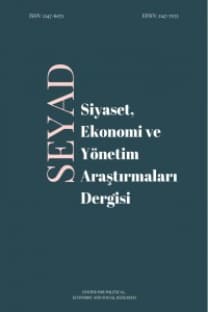Mobilya Sektöründeki Personellerin Mühendisten Beklentileri Örnek Bir Uygulama
Mühendislik, Mobilya Sektörü, Üretim Yönetimi, Verimlilik, Mühendis
Expectations of Personnel Working in The Furniture Sector From an Engineer A Case Study
Engineering Furniture Sector, Production Management, Productivity, Engineer Performance, Finance Sector,
___
- Anonim 1, (2018). http://www.teknikicerik.com/muhendis-nedir.html (Erişim Tarihi: 30.05.2018).
- Anonim 2, (2018). http://www.gidagundemi.com/makale/bir-muhendisten-beklentiler- m120.html (Erişim Tarihi: 28.05.2018).
- Anonim 3, (2018). http://www.yenimesaj.com.tr/ekonomi/muhendis-istihdami-yetersiz- h656220.html (Erişim Tarihi: 28.02.2018).
- Baran, T., Kahraman, S., (1999). “Yetkin Mühendislik ve Eğitim,” Mühendislik Mimarlık Eğitimi Sempozyumu, İstanbul, s. 239-249.
- Gedik, T., Batu, C., Akyüz, K. C., (2006). “Orman Endüstri Mühendislerine Lisans Düzeyinde Verilen Eğitimin Değerlendirilmesi Üzerine Bir Araştırma (Abant Izzet Baysal Üniversitesi ve Karadeniz Teknik Üniversitesi Örneği),” Abant İzzet Baysal Üniversitesi Orman Fakültesi Dergisi, c. 2, s. 2, s. 1-14.
- Sönmez, M., (2011). Mühendis ve Mühendis Yardimcilarinin Yaşam Boyu Öğreniminde Meslek Yüksekokullarinin Rolü, Electronic Journal of Vocational Colleges, December/Aralık.
- Teker, S., Özer, B., (2012). Yeni Vakıf Üniversiteleri Kuruluş Yeri Seçimi ve Akademik Alan Odaklanma Önerileri, İşletme Araştırmaları Dergisi, 66-93-(4/2).
- ISSN: 2147-6071
- Yayın Aralığı: Yılda 2 Sayı
- Başlangıç: 2014
- Yayıncı: Politik Ekonomik ve Sosyal Araştırmalar Merkezi
Mobilya Sektöründeki Personellerin Mühendisten Beklentileri Örnek Bir Uygulama
Mehmet ÇOLAK, Tahsin ÇETİN, Abdi ATILGAN, Utku Sabit YAZGAN
Ömer İSKENDEROĞLU, Saffet AKDAĞ
G-7 ve G-20 Ülkelerinde İyi Yönetişim Nasıl Olmalı?: Teorik Bir Değerlendirme
Mine IŞIK, Özlem Öztürk ÇETENAK
Aslı KURT, Kutalmış Emre CEYLAN
Türkiye’de Demokratikleşmeyi Anlamak: Demokratikleşme Paketleri Üzerine Bir İnceleme
2000’lerde Türkiye Ekonomisi Performansı
Siyasal İletişimde Propaganda Aracı Olarak Seçim Müzikleri: 24 Haziran 2018 Seçimleri Örneği
Örgütsel Güven ile Bireysel İş Performansı Arasındaki İlişki
Mithat TURHAN, Onur KÖPRÜLÜ, İlter HELVACI
Managerial Roles for Health Services: Quinn’s Competing Values Framework CVF Model
Gamze Bayın DONAR, İlkay Sevinç TURAÇ
Kalkınma Ajansları Yoluyla Yapılan Yatırım Teşviklerinin 2013-2014 Döneminde Etkinlik Analizi
